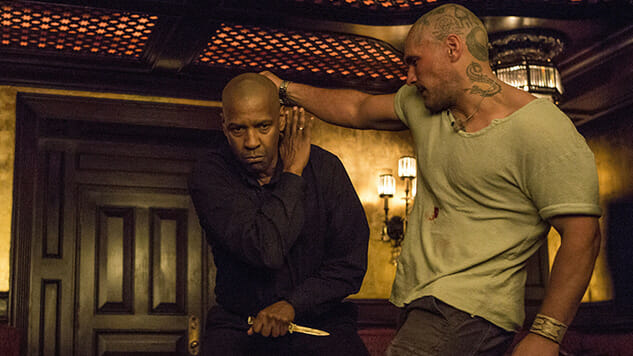The Equalizer 2
"The Equalizer 2" follows Robert McCall (Denzel Washington), a former black-ops operative turned vigilante who seeks justice for those who cannot protect themselves. The film opens with McCall continuing his mission to right the wrongs of the world, but things take a personal turn when his close friend and former colleague, Susan Plummer (played by Melissa Leo), is murdered. This tragic event propels McCall into a world of betrayal and vengeance as he sets out to track down those responsible for Susan’s death.
What sets this film apart from other action thrillers is the emotional weight it carries. McCall’s motivations are deeply personal, and his sense of loss and loyalty to Susan add a layer of complexity to his otherwise stoic persona. As McCall navigates a world of deception, he faces moral dilemmas that test his beliefs and actions, making for an action-packed yet emotionally resonant journey.
2. The Return of Robert McCall:
Denzel Washington’s portrayal of Robert McCall is one of the main reasons why "The Equalizer" series has become so popular. In the sequel, we see McCall in familiar territory, using his formidable skills to help people in need. However, the character’s personal journey in this film is much more complex than in the first installment. He’s not just out for justice—he’s seeking closure and revenge for the death of a friend.
Washington masterfully blends McCall’s calm, calculating nature with moments of intense rage, creating a character who is both methodical and emotionally driven. McCall’s moral compass remains strong, but his growing sense of personal loss pushes him into a darker, more vulnerable space. Washington’s nuanced performance anchors the film and adds emotional depth to the action.
3. The Action Sequences:
. From high-speed chases to close-quarter combat, the action is tightly choreographed and executed with precision. However, what makes McCall's combat style unique is his ability to think several steps ahead, using his environment to his advantage. Whether he’s taking down armed assailants or using his intelligence to outsmart enemies, McCall’s resourcefulness is a key aspect of the film’s action sequences.
One standout sequence involves McCall taking down an entire gang of mercenaries in a warehouse, using only his wits and the objects around him. It’s a testament to the character’s ingenuity and Washington’s ability to sell each moment of danger with authenticity. The film doesn't rely solely on flashy special effects but rather on raw, brutal physicality and suspense, making each fight feel grounded and impactful.
4. Themes of Loyalty and Revenge:
. When his friend is murdered, McCall’s sense of justice becomes personal, and he will stop at nothing to uncover the truth behind her death. The film explores the theme of vengeance, but also the emotional cost of it. McCall’s pursuit of justice takes him down a dangerous path, forcing him to confront his own morality.
The film doesn’t simply glorify vengeance; instead, it highlights the emotional toll it takes on McCall and those around him. His actions may be justified in his eyes, but the collateral damage and moral consequences are clear. This thematic depth makes "The Equalizer 2" more than just a typical revenge story—it’s a meditation on justice, loss, and the cost of doing what’s right.
5. The Villains:
In any action thriller, a compelling villain is essential, and "The Equalizer 2" delivers on that front. The primary antagonist, played by Pedro Pascal, is a character with personal motivations that intersect with McCall’s. Unlike typical villains, he’s not driven by power or money but by deeper personal reasons, making him a more complex and multifaceted threat.
The cat-and-mouse dynamic between McCall and his enemies is one of the highlights of the film. As McCall uncovers layers of betrayal, the stakes continue to rise, and the tension between him and the antagonists builds to a gripping climax. The film’s exploration of moral ambiguity is also evident in the way the villains are portrayed, challenging McCall’s perception of right and wrong.
6. Cinematic Style and Direction:
Antoine Fuqua’s direction in "The Equalizer 2" is sharp and focused, maintaining a strong sense of pacing throughout the film. The film expertly balances moments of high-octane action with quieter, more introspective scenes, allowing for emotional depth to shine through the chaos. Fuqua’s signature style of tight, gritty shots keeps the audience engaged during tense moments, and his understanding of the characters makes each scene more impactful.
The cinematography further enhances the film’s atmosphere, with sweeping cityscapes contrasting against dark, shadowy interiors. The use of lighting and framing plays a pivotal role in highlighting the tension and emotional gravity of each scene, particularly during McCall’s most vulnerable moments.
7. Reception and Critical Response:
Upon its release, "The Equalizer 2" received generally positive reviews, with critics praising Washington’s performance, the film’s action sequences, and its emotional depth. While the film may follow some familiar tropes, it stands out as a thoughtful exploration of revenge and justice, thanks to its strong performances and well-executed direction.
Audiences appreciated the continuation of McCall’s story, and the film was a commercial success, further cementing the franchise's place in the action genre. Denzel Washington’s portrayal of McCall continues to resonate with viewers, and the film’s ability to balance intense action with heart is what makes it a standout sequel.

.jpg)
.jpg)
-1741321909070_v.webp)
.jpg)
Comments
Post a Comment